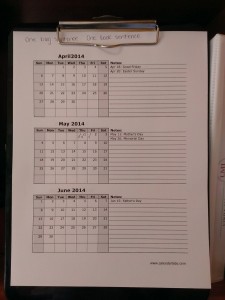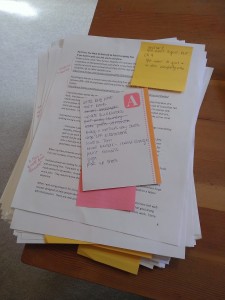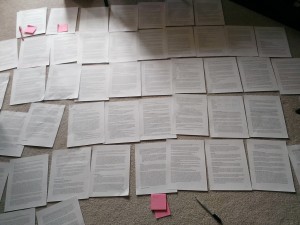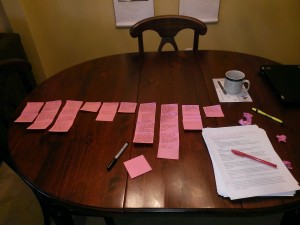Tag: outlines
How to Get Stuff Done When You’re Working For Yourself
I’m a productive person. I like to get stuff done. I’m not new to this. I make lists, I use Outlook to schedule my days and my tasks. I have a spreadsheet of running projects and detailed steps to complete them.
But now it’s 5:14PM, I’ve got to leave for yoga at 5:30PM and where did the day go? I did my day-job stuff. I emailed the landscaper to follow up on a quote. I updated expense information for my startup business. I sent three personal emails. So it’s not like I wasted the day. But crap. I’m staring down a weekly to-do list full of tasks that I haven’t done yet, including making progress on my two most important goals: revising my manuscript and updating my blog. Staring at a list full of things to do that are not checked off feels like staring the in the face of futility.
I’m irritated with this day.
I did not get up early to work on editing my book and I didn’t work on it during lunch. I just…ate lunch. OK it’s after work and I’m writing this blog post. But now it’s 5:17PM and I have 13 minutes until I need to be in the car, on my way to yoga.
This isn’t working.
I didn’t want working on my book or blog to feel like pressure or a chore, or something negative that I dreaded. Nobody is forcing me to do these things. My deadlines are made-up.
That’s the problem. I’m really good at meeting deadlines imposed by structures outside of myself. Whenever I’ve taken classes, I’ve always done my homework and turned in my assignments on time. I pride myself on always hitting my work deadlines.
But when it is my own deadline, it’s much easier to blow off.
5:27PM. Got to go. Dammit. Just when I was getting somewhere with this blog post.
May 1st, 2014, 6:28AM
Milo kept walking on me and making noise so I got up. I wanted to be up before 7AM anyway to work on my book and this blog post before I start my day job. So now I’m up and my eyes are barely focusing. Is this how it has to be? In order to make progress on my writing I have to be pushed into it?
When I was working my corporate job and running on adrenaline I got a ton of stuff done. I was always going, rushing, doing. Since I’ve unplugged from that machine, I’m on a slower pace. I’m still efficient with specific projects, but I don’t get as much done in a day. Transitions take longer.
I’ve been emailing a friend about this topic and he sent me a link to this article about Jerry Seinfeld’s Chain Habit. The idea is to put an X on a calendar for every day you work on your goal. When you see the lines of X’s, you don’t want to break the chain.
It’s like when we were kids and we got a little star sticker for each day that we did whatever task we were supposed to do. Except that back then, it didn’t motivate me. I felt manipulated and the reward of a sticker wasn’t stronger than my drive for autonomy.
But now I’m only struggling against telling myself what to do, and making a daily commitment worked for me in the past. When I finally got my first draft written for my book, it was because I committed to opening my word doc every single day and writing one sentence. Even on Thanksgiving and Christmas Day when I was at my parents’ house, I had my PC with me. Of course once I had the word doc open I wrote a lot more than one sentence.
I’ve been frustrated with how little I’ve done to revise my book, and think the solution is the same one that I did with the first draft – to commit to opening the word doc and revising one sentence every day. I kept deluding myself that I need larger chunks of time to get my head into editing mode, but I haven’t been using the big blocks of time that I do have so it’s time to try something else.
There’s got to be a way of making significant progress without resorting to becoming addicted to the process. Or maybe there isn’t. Because the Chain Habit or committing to writing every day no matter what feels like an addiction as much as a habit.
Maybe the difference is limiting the time spent. Maybe it is healthy enough to be addicted to writing a bit every day if I also do my day job well and keep enough time in my day for the other things I want to do plus a certain amount of unstructured time each week.
I emailed my friend about this and he wrote back musing about the difference between addiction and habits. I found an article on the topic that says habits can be good or bad and we have control over them. Addiction is negative and compulsive.
When I was in the habit of writing for my book every day, it felt good to make daily progress. Most of the time I wrote in the morning and started the day feeling good about working toward my goal. The times when it was late at night and I was tired and didn’t want to open my computer, I felt a sense of panic and did it anyway. I felt a compulsion. I did the work even when I didn’t want to, even when it was difficult to get to my PC, because I didn’t want to feel disappointed in myself for not doing it.
I wish I d idn’t have to pressure myself or create a situation where I feel afraid and dread if I don’t work on my writing. But at this point, the desire to achieve my writing goals is bigger than the desire to avoid bullying myself into doing the work.
idn’t have to pressure myself or create a situation where I feel afraid and dread if I don’t work on my writing. But at this point, the desire to achieve my writing goals is bigger than the desire to avoid bullying myself into doing the work.
I also hate being tied to my PC, but my PC is where my work happens. If I know I’m going to be away from my PC, I could save my files on OneDrive and at least go through the motion of opening the docs on my phone and writing. I could also write a blog post long-hand in my notebook and transcribe it later, and do the same with my book revisions, but it isn’t as effective as typing into my word doc. They aren’t perfect solutions but I guess I’d rather use these contingencies than “break the chain”. I’d rather have these backup plans in place than not set my goal in the first place.
May 2, 2014, 7:38AM
I got up at 6:30AM again today, and went right to my PC to work on this blog post. It’s day two of my new chain habit, and I can already X-off this goal. There’s still a little time to open my book document and revise at least one sentence today.
Then I’ll make a cup of tea and raise a toast to myself: here’s to my new addiction.
Sometimes The Outline Happens Last
I have been frustrated that I’m not making as much progress on my book as I wanted to. I finished the first draft in December and my goal was to revise it to the point where I could hand it off to a professional editor by the end of February. But it’s halfway through March and there’s a ton of rework to do before it’s ready for editing.
The biggest challenge I’ve had with the revision process is that the document hasn’t been well-organized. This book was born from a four-page outline that I wrote as a class assignment last July at the Jack Kerouac School. The outline describes what happens when people want to quit their jobs but feel stuck, talks about how to break through those barriers, and goes on to offer a plan for making an exit.
I still like that outline! But when I started writing the actual content I thought I needed to simplify it to three sections about timing, money and how to set yourself up for a positive experience after you’ve left your job. That format was easier for me to describe to people and seemed like a good container to fill. But I pretty quickly got into a bind when I wanted to write about topics that didn’t fit into either one of the outlines. At that point I was stuck for weeks and the only writing that happened was poetry and journaling.
Finally I gave myself permission to write whatever the hell I wanted to for my book. I had a running list of topics that I logged in a spreadsheet. When I sat down at my PC to write, I would either look at the list or just write whatever I felt like writing. I would open my word document, create a bold header for whatever the topic was about, and get to it.
On December 30th, the day that I finished my rough draft, I had an idea for a third outline based on steps that people could take to quit their jobs comfortably. I was thrilled with this last-minute inspiration because it sounded like something agents and publishers would go for. You know, “the seven steps to quit like a winner”. It has a great ring to it, don’t you think?
However, the more I reflected on it over the following weeks, I wasn’t sure those seven steps were really necessary, and there were topics I cared about that didn’t line up with this version of an outline either.
The problem I created for myself by adding section after section into my word document based on whatever I felt like writing each day was that there was no logical order. My draft was 100 pages of single spaced text and scrolling through page after page to find sections that seemed like they would fit together in chapters wasn’t working very well.
I thought that printing out the manuscript would help. I made a copy and started going through it with a red pen. But I sensed it was a wasted effort because I couldn’t see how the pieces connected to each other or the book as a whole.
I’d heard of authors spreading their manuscript pages on the floor and then walking around, sorting them. Maybe they have bigger living rooms than I do? I got about 50 pages down on the carpet before I ran out of room.
And there wasn’t enough space left for me to walk around and rearrange the papers, so I ended up walking on the paper, which made me feel like I was insulting myself. Milo, my cat, was confused at first and then he started walking on the papers, too. Cats are always happy to insult people.
Then I thought maybe it would be better if I got a pad of Post-its that I could write editing comments on and stick to the papers. Like, “move this section to the introduction.” I made a few notes, stuck them on the papers, and then Milo wanted to go out on the deck and a big gust of wind blew the papers all over. Enough of that.
But the notes gave me an idea. I wrote the different topics of the book on individual Post-its and saw patterns emerge. Before long I grouped each topic that I had written about into chapters, and moved the chapters into a logical order. They are now tidily laid out on my dining room table.
A bunch of pink Post-its might not seem like a big deal, but it is a big step towards making my book a reality. Now I can go back through the printed manuscript and re-order the pages to match the chapters, and then make revisions knowing how each topic flows into the next.
It would have been a much easier process if I could have written the book in order all the way from the introduction to the afterward. I love plans – planning is smart, saves time and helps get results. But that’s not how it went. Sometimes the outline happens last.





Recent Comments